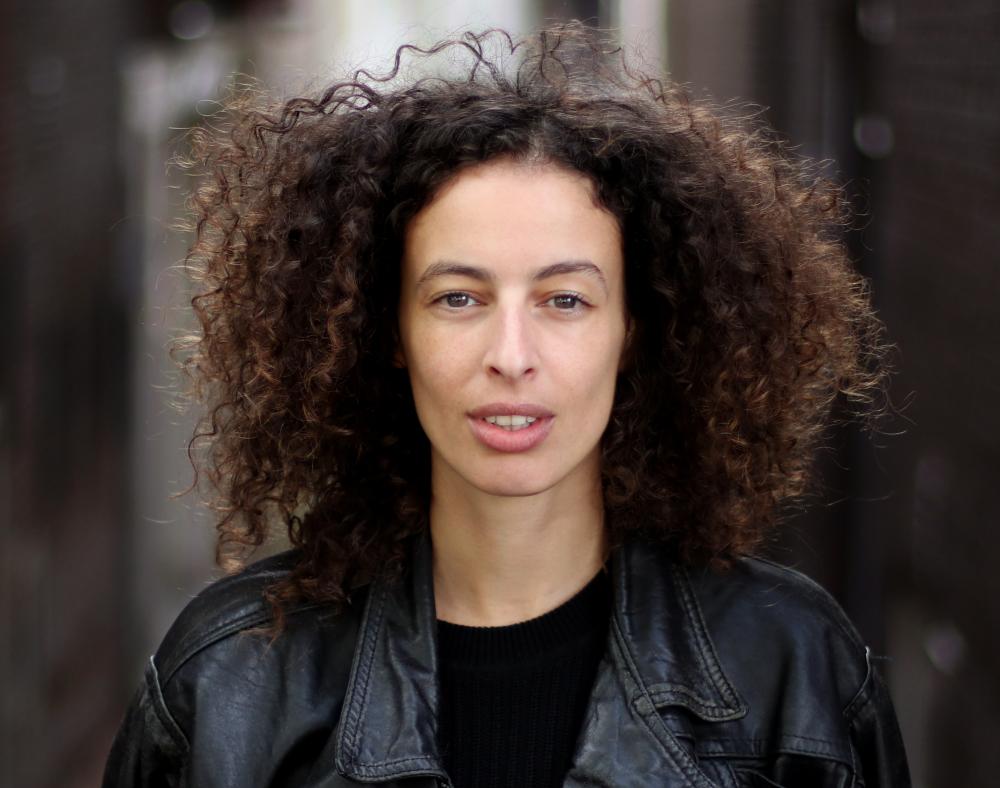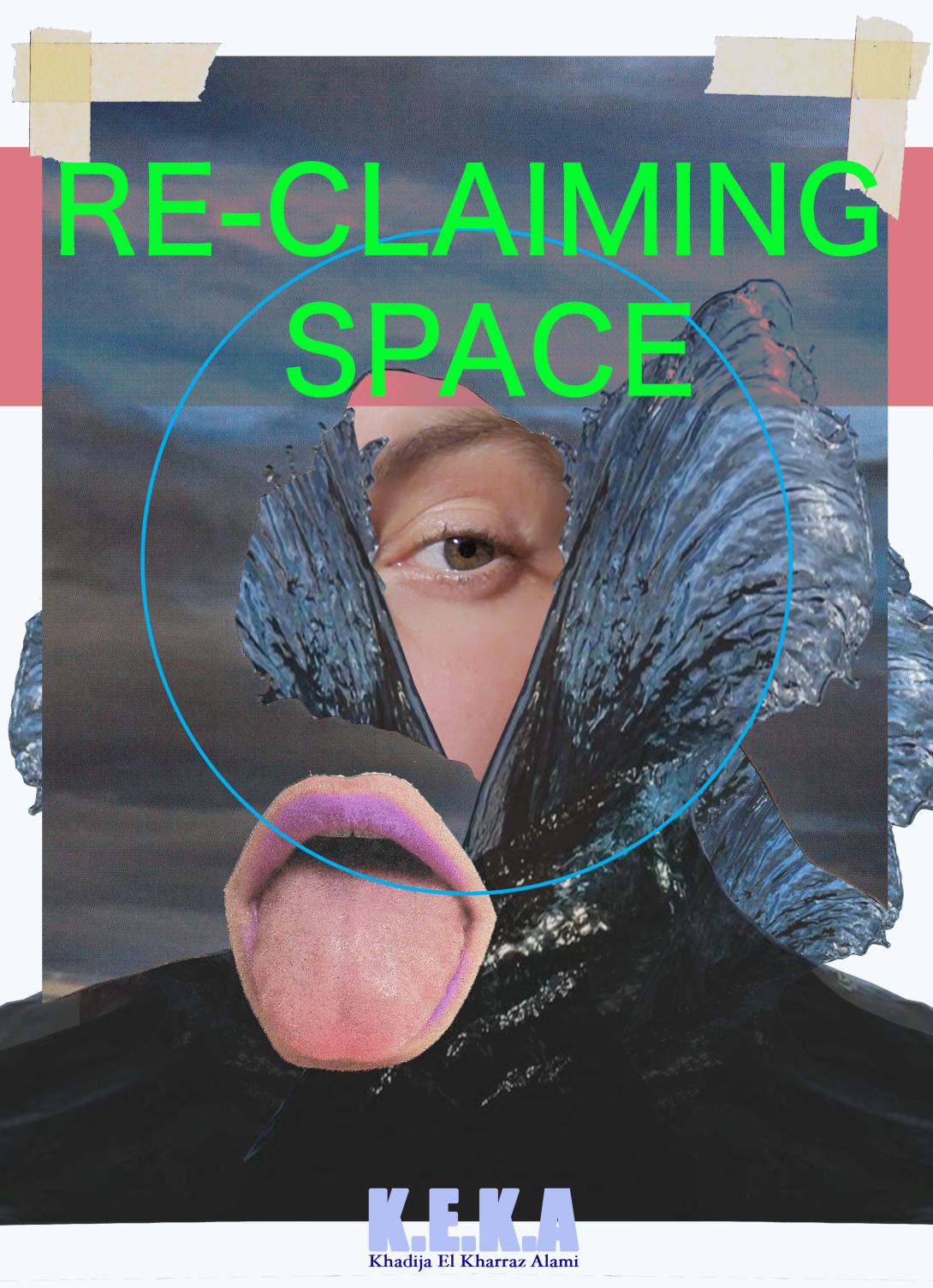'It is time to 're-claim' my own space'
in conversation with Khadija El Kharraz Alami
an interview with Khadija El Kharraz Alami, by Eva Decaesstecker (Kaaitheater, Saptember 2020). Translated by John Arblaster.
Due to corona, Khadija El Kharraz Alami unexpectedly closed the Kaaitheater season in March with her first solo Now I am Medea at the Kaaistudios. Six months later, we are welcoming her to the main stage with the performative research performance Re-claiming Space – a preliminary study for a new project about Virginia Woolf’s The Waves. Alami: ‘I just want to show what I define as beautiful, powerful, and vulnerable.’
Re-claiming Space is a preliminary study for a new production based on Virginia Woolf’s The Waves. Why that work? And what do you plan to do with it?
There were several essays that I was interested in: Women Who Run With the Wolves by Clarissa Pinkola Estés, A Room of One’s Own by Virginia Woolf, Your Silence Will not Protect You by Audre Lorde, Rethinking Commemoration by Simon(e) van Saarloos. In my search for a different kind of text that might draw these essays together, I found The Waves. In my work, I always look for a piece that inspired me but which I can also resist.
It was only later that I realized how challenging The Waves actually is. It is Woolf’s most experimental work; it has no plot and it is constructed very rhythmically. The characters exist independently and have their own thoughts and desires. I find the impossibility of staging the work very interesting.
In The Waves, I hope to present an evening during which everyone in the audience experiences that they are necessary to keep the story moving. The characters are each embodied by performers who move through the space. The audience moves with them through their thought processes, creating an immersive theatre experience. Due to corona, however, our concrete plans are still open. We are not certain how the proximity and movement of the audience will take shape.
In addition, I am writing texts for the adaptation myself. Because the work is very literary and expressive, I also think of the language as a form as such. I usually move from content and texts to form, but now I am attempting to move from the form while relying on the content. It is about being a woman, which I am too.
In your preliminary research, which is being staged at Kaaitheater at the beginning of October, you invite a woman onstage every evening for an initial encounter. Who are these women?
I don’t know any of the women I invite on to the stage personally, but they use perspectives in their work and life that I find inspiring. The selection occurs very intuitively. The first woman, for example, is a former Brazilian dancer who lives in Antwerp and now works as a designer, among other things. What I find interesting about her work is the female perspective combined with, for example, the struggle that she experiences as a mother when she received commissions.
I refer to Re-claiming Space as a ‘performative research performance’ because the audiene witnesses the research. At the same time, my work always shows the research process because I don’t want to record everything. I work with improvisational elements, with not-knowing. And I thought such initial encounters was an interesting form of ‘not-knowing’. The guests are given a kind of script with guidelines so that it is an equal encounter. I have been here a while and have my own predetermined texts. They are being thrown in the deep end, as it were. I want to create a kind of safe space in which they also feel as though they can reclaim space.
Re-claiming Space is about being a woman. Why is that an important subject to you?
More than anything, I want to show my definition of what it is to be a woman and its enormous diversity. It is time to reclaim my own space. I experience that my being – whatever it may be – is not self-evident and does not comply with the norm. I move differently, which has led to experiencing a lot of loneliness, oppression, and incomprehension. My previous solo, Now I am Medea, was about how I am often perceived as fierce and complicated. I always draw inspiration from a personal source, and my performances thus always run parallel with my private situation.
Now I just want to show what I define as beautiful, powerful, and vulnerable. As someone who can easily take care of herself, I also have a tendency to be self-effacing. Not to be too much, especially when looking for love or relationships, but also in professional relationships. I tend to curtail my fierceness for other people because they usually can’t manage how unconventional I am. I have always sought recognition because I don’t come from a stable home situation – a single mother with whom I have a difficult relationship, an absent father – and I am also the other in society – Moroccan parents, Muslim heritage, queer. Despite everything, I have managed to persevere. And that process, the development of who I am now and what I therefore find beautiful or ugly or what I dream or fantasize about, that is what I want to share.
In what way is Re-claiming space a preliminary study for The Waves? Which part of the artistic process do we see in this study?
In terms of form, Re-claiming space was literally: how close can I get to my audience? Because of corona, that is no longer to be taking literally. I now seek proximity through the text. How far can I go to make the audience react? This preliminary study gives me the opportunity to try things out in the audience’s presence. In many ways, it is very artisanal. In my work, I constantly research the nature of my craft, of theatre, of theatrical conventions. I question them all the time because I feel that they were not designed by me. They are the result of Western elitist thinking, and I want to be able to question them uninhibited.
At the same time, the preliminary study is also the expression of a commitment. For Now I am Medea, I claimed in my preliminary study that I could identify entirely with all the characters in Medea. It was an absurd challenge, but from the moment I had said it to the audience, it really felt as though I had made a promise. It is also a way for me to keep moving, make myself vulnerable, by making an impossible statement like ‘I am going to make an adaptation of The Waves’, by challenging myself.
Through such first encounters, you show your research and allow the audience to become part of the creative process. The audience sees a lot, but not everything of course. What do you choose not to show or not yet?
What you do not see in Re-claiming Space is something I do a lot in Medea. That piece is about institutional racism, discrimination, being oppressed, my cultural background… These are issues that to me are related to the figure of Medea: she arrives in Greece as a stranger and is seen as the other, fear. I perform a classical tragedy but with elements that are related to my own background, making it hyper personal.
In the new performance, you do not see that literalness that I would normally show because I am done with it. I have always felt obliged to explain my presence, as though I had to justify why I am permitted to participate.
This time, I do not want to take responsibility because I am a woman of colour onstage; I do not want to be a role model. I am who I am, and you can identify with my search. I also just want to be able to stir the colour blue, as it were, without being politically correct or socially committed. The fact that – knowing where I come from – I have gotten to where I am, I do what I do, and I am performing in a big venue is revolutionary enough. It no longer needs to be the explicit subject of the performance because my presence automatically implies it.
In a performative research performance, questions about what I show, what I give away, what I manipulate, how transparent I am, are important. It remains both a performance and a research project and I am grateful that an audience wants to witness it. What is not shown is a question that I absolutely think about because as an actor I like to exercise my discipline while doing research and to be transparent as a performer. I step in and out of the performance and react to what happened – both onstage and in the audience.

